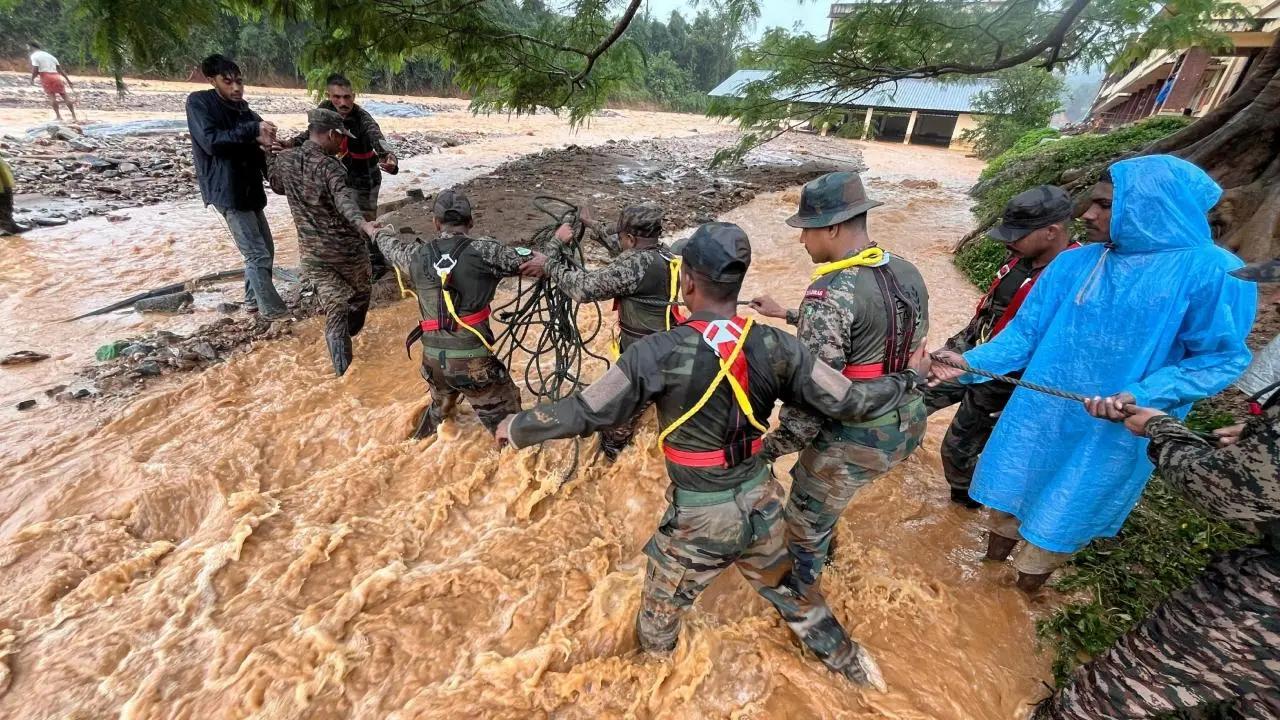Scientists from Kerala and beyond attribute the disaster to a deadly mix of forest cover loss, mining in the fragile terrain and climate change.

NDRF, Indian Army personnel are engaged in rescue and relief efforts post Wayanad landslides/ PTI
The Centre has issued a fresh draft notification to declare over 56,800 square kilometres of the Western Ghats across six states, including 13 villages in Kerala's landslide-hit Wayanad, an Ecologically Sensitive Area (ESA), inviting suggestions and objections within 60 days.
ADVERTISEMENT
The notification, issued on July 31, came a day after a series of landslides claimed over 300 lives in Wayanad district.
Scientists from Kerala and beyond attribute the disaster to a deadly mix of forest cover loss, mining in the fragile terrain and climate change.
The draft notification proposes to declare 9,993.7 sq km in Kerala, including 13 villages in two talukas of the landslide-hit district, as ecologically sensitive.
These villages are Periya, Thirunelli, Thondernad, Thrissilery, Kidanganad and Noolpuzha in Mananthavady taluka, and Achooranam, Chundel, Kottappadi, Kunnathidavaka, Pozhuthana, Thariyod and Vellarimala in Vythiri taluka.
The July 30 landslides affected Mundakkai, Chooralmala, and Attamala villages in Vythiri taluka which do not figure in the draft notification.
Overall, the notification proposes to declare 56,825.7 sq km as ecologically sensitive, including 449 sq km in Gujarat, 17,340 sq km in Maharashtra, 1,461 sq km in Goa, 20,668 sq km in Karnataka, 6,914 sq km in Tamil Nadu, and 9,993.7 sq km in Kerala.
An official said that the latest draft is much more detailed and that "there are no major changes in terms of total area".
"We are hopeful that it will finally be notified," the official added.
The Environment Ministry has issued six draft notifications, including the one issued on July 31, since March 10, 2014, but the final notification is pending amid objections from states.
According to the fresh draft notification, an expert panel set up in April 2022 to find a breakthrough has held nine meetings since July 2022, "wherein various objections, comments, and suggestions were received from the states".
"The committee is addressing the issues raised by the states in the Western Ghats region on discrepancies or information gaps in the draft notification dated July 6, 2022, on the correct names and areas of villages to be included in the ecologically sensitive area. The committee is also examining the suggestions received from the state governments," it read.
The draft notification suggests a complete ban on mining, quarrying, and sand mining, with existing mines to be phased out within five years "from the date of issue of the final notification or on the expiry of the existing mining lease, whichever is earlier".
It prohibits new thermal power projects and states that existing projects can continue to operate but no expansion will be allowed.
All 'Red' category industries (highly polluting), specified by the pollution control boards, and their expansion shall be banned, it said.
Large-scale construction projects and townships are also proposed to be prohibited, with exceptions for the repair and renovation of existing buildings.
In 2010, the Centre formed the "Western Ghats Ecology Expert Panel" under ecologist Madhav Gadgil to study the impact of population pressure, climate change, and development activities on the Western Ghats, a global biodiversity hotspot declared a world heritage site in July 2012 by the United Nations Education, Scientific and Cultural Organisation (UNESCO).
The panel recommended in 2011 that the entire hill range be declared an ESA and divided into three Ecologically Sensitive Zones (ESZ 1, 2, and 3) based on their eco-sensitivity.
It recommended a ban on mining, quarrying, new thermal power plants, hydropower projects and large-scale wind energy projects in ESZ 1.
However, these recommendations faced resistance from state governments, industries and local communities.
In 2013, the Centre formed a High-Level Working Group under rocket scientist K Kasturirangan to study and recommend measures for the Western Ghats' ecological protection and sustainable development.
This group identified 37 per cent of the Western Ghats, covering 59,940 square kilometres, as ecologically sensitive.
This story has been sourced from a third party syndicated feed, agencies. Mid-day accepts no responsibility or liability for its dependability, trustworthiness, reliability and data of the text. Mid-day management/mid-day.com reserves the sole right to alter, delete or remove (without notice) the content in its absolute discretion for any reason whatsoever
 Subscribe today by clicking the link and stay updated with the latest news!" Click here!
Subscribe today by clicking the link and stay updated with the latest news!" Click here!







